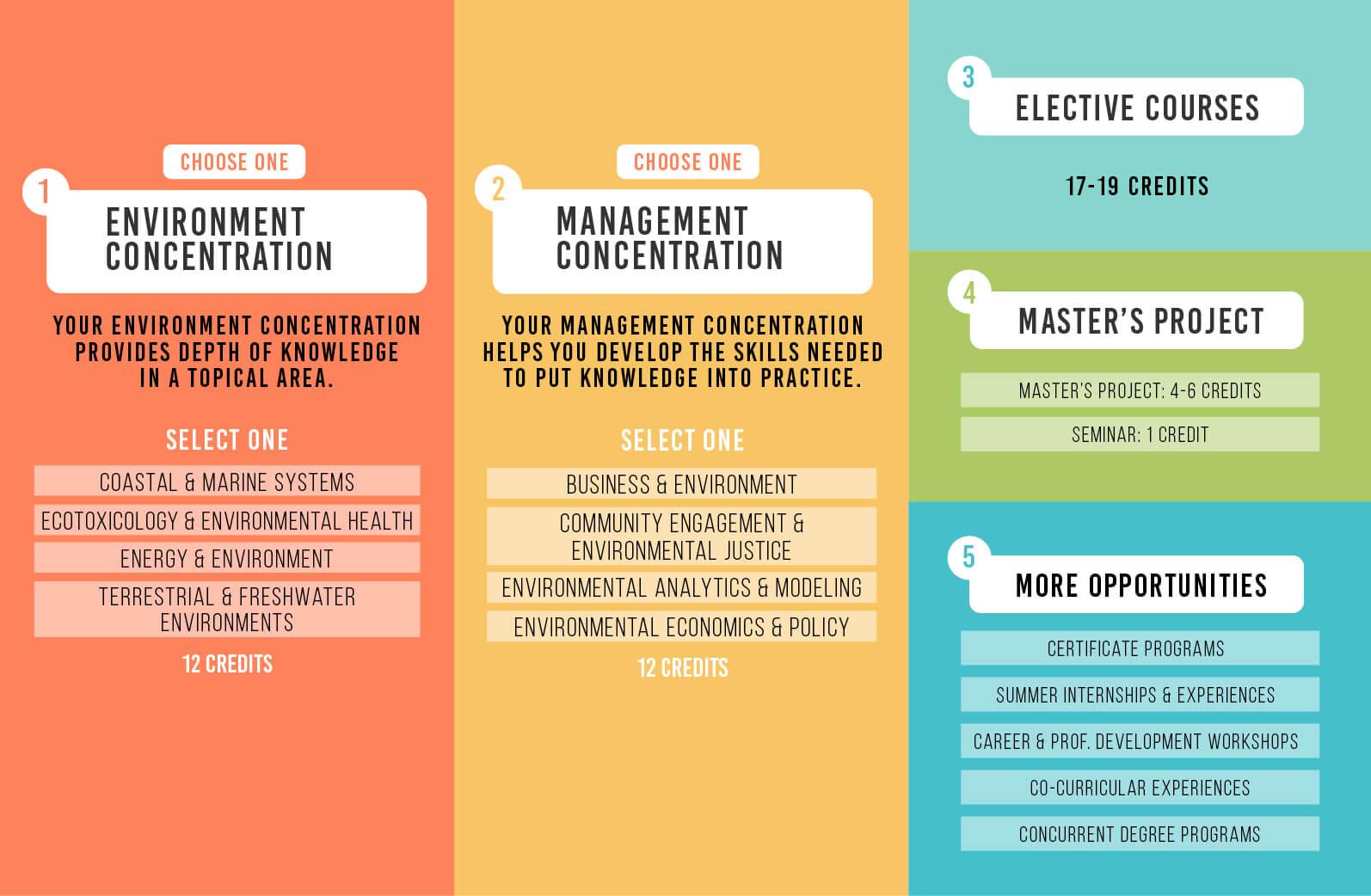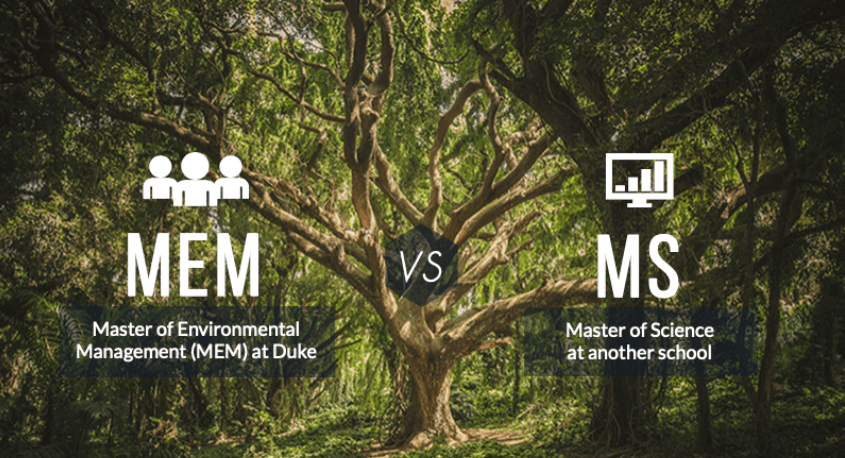tailor your degree to what's important to you
Download the MEM experience map (PDF) to see how you can combine opportunities aligned with your interests and passions to craft a graduate school experience that will equip you for career success rooted in making meaningful change in the world.
Concentration Courses
The Master of Environmental Management curriculum allows you to customize your education to what is important to you by selecting two concentrations—one environment concentration and one management concentration. Students will take four courses, or 12 credits, in each of their two selected concentrations.
IMPORTANT: We are in the process of finalizing course requirements for the MEM concentrations. The list below is intended to provide examples of courses we have offered in the past to support each area of knowledge and skill building.
Environment Concentrations – Select One
Your Environment Concentration is designed to provide depth of knowledge in a primary topical area. You will choose one Environment Concentration and will take four courses in this area.
Coastal and Marine Systems
COASTAL AND MARINE SYSTEMS (CAMS) CONCENTRATION
Professional students will gain a deep understanding of the complex interactions between people and oceans, examining coastal processes and environments, while learning to assess and manage how human activities affect—and are affected by—these vital ecosystems.
Transferable Skills
- Practical understanding of coastal and marine ecosystems in a changing world
- Marine policy analysis and governance
- Interdisciplinary problem assessment and analysis
- Field skills for working in natural and human coastal and marine systems
- Management of common pool marine resources
- Community-based environmental management*
- Geographic information systems/geospatial analysis*
- Applied data analysis
*Students in our program often pair this concentration with the certificate program in Geospatial Analysis to provide additional skills in this area.
We strive to give students:
- A scientifically rigorous understanding of marine and coastal environments and processes at global, national and local scales
- A deep understanding of how human behaviors and policies interact with marine and coastal bio-physical environments and processes.
- Opportunities to understand and assess the policymaking process
- A range of skills in quantitative, qualitative, and analytical methods
- The communication and teamwork skills needed to thrive in professional work environments
COURSE REQUIREMENTS
Students are required to take one fundamental coastal and marine natural science, and one fundamental coastal and marine social science course. Students are also required to take two selected concentration electives, one from a list of natural science courses and one from a list of social science and policy courses. The remainder of the concentration courses can be customized by the student and their advisor to support their professional development goals. Most CAMS students will spend their second year at the Duke University Marine Laboratory, located in Beaufort NC. Courses with the A suffix are generally taught at the Marine Lab.
- ENVIRON 707 Coastal and Marine Ecosystems (3 credits)
- ENVIRON 786/A Marine Policy (3 credits)
- Coastal and Marine Systems concentration natural science elective. Examples include but are not limited to:
- ENVIRON 719/A Aquaculture and the Environment (3 credits)
- ENVIRON 729A Oceans in Human and Environmental Health (3 credits)
- ENVIRON 773A Marine Ecology (4 credits)
- ENVIRON 776/A Marine Mammals (3 credits)
- ECS 715 Introduction to Coastal Environmental Change Processes
- Coastal and Marine Systems concentration social science and policy elective. Examples include but are not limited to:
- ENVIRON 502 Climate Change and the Law (2 credits)
- ENVIRON 506 Environmental Justice: Theory and Practice (3 credits)
- ENVIRON 528SA Community-Based Marine Conservation (3 credits)
- ENVIRON 533A Marine Fisheries Policy (3 credits)
- ENVIRON 775 Ocean and Coastal Law and Policy (3 credits)
- ENVIRON 860SA Political Ecology (3 credits)
Ecotoxicology and Environmental Health
ECOTOXICOLOGY AND ENVIRONMENTAL HEALTH (EEH) CONCENTRATION
Understand how pollutants affect the health of people and ecosystems by assessing the fate, effects and risks of pollutants using a multidisciplinary approach that incorporates toxicology, environmental chemistry, risk assessment and ecology.
Transferable Skills
- Ecological and human risk assessment
- Environmental exposure assessment
- Predicting pollutant fate and transport
- Understanding toxic modes of action
- Environmental epidemiology & health
- Molecular and analytical tools for environmental health research
We strive to give students:
- A solid foundation in the scientific principles underlying pollutant fate and transport, environmental exposures, and impacts on human and ecological health
- The knowledge and skills to understand the concepts and methodologies used in the fields of toxicology, environmental chemistry, risk assessment and ecology
- Training in state-of-the-art approaches for evaluating environmental contamination, and for making management decisions using quantitative tools and approaches
- Oral and written skills to communicate scientific studies and management outcomes to a wide audience, especially at the interface of science, policy and the public
COURSE REQUIREMENTS
Students must choose between two EEH Concentration Tracks: Traditional or Research.
EEH Traditional Track Course Requirements – 4 courses
- ENVIRON 537 Environmental Health (spring)
- ENVIRON 539 Human Health & Ecological Risk Assessment (spring)
- ENVIRON 560 Environmental Health Pollutant Chemistry and Toxicology (spring)
- Choose one additional course from the list below:
- ECS 525: Ocean and Freshwater Pollution (fall)
- ENVIRON 538: Global Environmental Health: Economics and Policy (ad hoc)
- ENVIRON 605: Air Quality Management (fall)
- ENVIRON 610: Ecotoxicology (ad hoc)
- Additional courses can be considered with the consent of the EEH chair.
EEH Research Concentration Track Course Requirements* – 6 courses
- ENVIRON 501 Environmental Toxicology (fall)
- ENVIRON 537 Environmental Health and Epidemiology (spring)
- ENVIRON 539 Human Health & Ecological Risk Assessment (spring)
- ENVIRON 540 Chemical Fate of Organic Compounds (fall) OR ENVIRON 542L Environmental Aquatic Chemistry (fall)
- Students in the Research Track must choose two additional courses (see list below) in one of the following areas of specialization: Toxicology, Chemistry, and Epidemiology & Environmental Health (6 credits minimum). Not all classes are offered on a regular basis. See course schedule for current course offerings.
- Toxicology Specialization – Recommended courses include graduate level toxicology, physiology, biochemistry, and molecular biology field. Suggested additional courses are listed below; other alternative courses may be substituted with approval by the EEH Chair.
- ENVIRON 516 Global Change: Molecules to Organisms (3 credits)
- ENVIRON 610 Ecotoxicology (3 credits)
- ENVIRON 819 Mechanisms in Environmental Toxicology (3 credits)
- PHARM 533 Essentials of Pharmacology and Toxicology (3 credits)
- TOXC 707 Advanced Toxicology at UNC-Chapel Hill (3 credits)
- Chemistry Specialization – ENVIRON 540 and ENVIRON 542L are required courses for students specializing in environmental chemistry, plus at least one course from the list below. Suggested additional courses are listed below; other alternative courses may be substituted with approval by the EEH Chair.
- ENVIRON 667 Chemical Transformation of Environmental Contaminants (3 credits)
- ENVIRON 790 Environmental Cheminformatics (3 credits)
- ECS 571 Isotopes in Earth and Environmental Sciences (3 credits)
- CEE 666 Aquatic Geochemistry (3 credits)
- Epidemiology & Environmental Health Specialization – Two additional courses (not including the core environmental health classes) in a graduate level field are required. Suggested additional classes are listed below. Other classes not listed here may be substituted with approval by the EEH Chair.
- ENVIRON 538 Global Environmental Health: Economics and Policy (3 credits)
- ENVIRON 605 Air Quality Management (3 credits)
- GLHLTH 705 Biostatistics and Epidemiology I (4 credits)
- GLHLTH 707 Biostatistics and Epidemiology II (4 credits)
- Toxicology Specialization – Recommended courses include graduate level toxicology, physiology, biochemistry, and molecular biology field. Suggested additional courses are listed below; other alternative courses may be substituted with approval by the EEH Chair.
*NOTE: It is highly recommended that all students take ENVIRON 710 (Applied Statistical Modeling for Environmental Management). Students may also register for up to 8-10 MP credits to support a more research-intensive Master’s Project.
Energy and Environment
ENERGY and environment (EE) CONCENTRATION
Train to become an expert problem solver with the interdisciplinary skills and knowledge needed to lead the transition to a more sustainable energy future.
Transferable Skills
- Energy system design and analysis
- Energy technology, policy and economic evaluation
- Energy finance
- Decision models and methods for the energy sector (data analytics, optimization, simulation)
- Power market modeling
- Environmental impact assessment and sustainable energy solution design
We strive to give students:
- A broad perspective on the current energy system and future alternatives
- A fundamental understanding of science and technology as they relate to energy and the environment
- Background in the economics, policy, and business of energy
- First-hand exposure to the energy sector and energy leaders
- Experience with communication, facilitation, project management and teamwork
COURSE REQUIREMENTS
- ENVIRON 520 Resource and Environmental Economics I (1.5 credits, fall year two) and ENVIRON 635 Energy Economics and Policy (1.5 credits, fall year two)
- ENVIRON 631 Energy Technology and its Impact on the Environment (3 credits, spring year one)
- ENVIRON 711 Energy and Environment (3 credits, fall year one)
- ENVIRON 716L Modeling for Energy Systems (3 credits, fall year one)
Terrestrial and Freshwater Environments
Terrestrial and Freshwater Environments (TFE) Concentration
Gain a foundational and practical understanding of processes that shape terrestrial and freshwater environments, and the couplings between these ecosystems.
Transferable Skills
- A perspective of human-environment interactions and functions at the watershed and landscape scale
- An appreciation of how watersheds and landscapes spatially integrate processes within them
- Management issues that arise in heterogeneous systems, and solutions to these issues
- Facility in translating natural science into management action
We strive to give students:
- Foundational knowledge in the natural sciences of ecology and hydrology
- The opportunity to embrace either terrestrial or freshwater systems while understanding the tight coupling between them
- Options to complement the natural sciences with alternative toolkits, in career-defining choices
- Technical expertise in communicating natural science concepts for nontechnical audiences
COURSE REQUIREMENTS
Most of the courses below are 3 credits except where noted.
- Choose 2 foundational natural science courses from the following:
- The Climate System (ECS 511), Climate and Society (ECS 550), Landscape Ecology (ENVIRON 714), Hydrology in Environmental Management (ENVIRON 732), Watershed Hydrology (ENVIRON 734), Food Web Theory (ENVIRON 743), Forest Ecosystems (ENVIRON 503), Tropical Ecology (ENVIRON 517), Freshwater Ecosystems (ENVIRON 744), Biogeochemistry (ENVIRON 564), Soil Resources (ENVIRON 721), Urban Ecology (ENVIRON 646)
- Choose one specializing natural science course in your topical area:
- Water Quality Health (ECS 524), Environmental Toxicology (ENVIRON 501), Ocean and Freshwater Pollution (ECS 525), Functional Ecology of Plants (ENVIRON 505), Conserving the Variety of Life (ENVIRON 703), others as appropriate and approved by advisor
- Choose one social science course relevant to your focal area:
- Environmental Law (ENVIRON 835), Environmental Politics (ENVIRON 577), Water Resources Law (LAW 320, 2 credits), Resource and Environmental Economics I & II (ENVIRON 520, 521, 1.5 credits each) or Resources and Environmental Economics I & Economics of Forest Resources (ENVIRON 520, 680, 1.5 credits each), Land Use Principles (ENVIRON 550)
Management Concentrations – Select One
Your Management Concentration enables you to develop essential skillsets related to professional practice in the area you selected as your Environment Concentration. You will choose one Management Concentration and will take four courses in this area.
Business and Environment
BUSINESS AND Environment CONCENTRATION
Equip yourself to help organizations implement environmentally sustainable business practices, honing your skills and knowledge through practical applications, client-based consulting projects and interactions with industry leaders.
Transferable Skills
- Finance
- Life cycle and value chain analysis
- Strategic analysis
- Stakeholder analysis
- Applied data analysis
- Appreciative inquiry
We strive to give students:
- An understanding of how businesses connect to each other and to consumers through supply chains, and how business behaviors impact the environment.
- A broad perspective on the theory and drivers motivating firms to create sustainable business practices.
- A fundamental understanding of science and technology as it relates to sustainable business practices.
- A background in economics, policy and business strategies.
- First-hand exposure to industry leaders and currently active sustainability programs.
- Critical skills in data analysis and modeling.
- An understanding of how innovation, entrepreneurship and intra-preneurship are essential in addressing pressing sustainability problems.
Course Requirements
- ENVIRON 782 Marketing for Environmental Professionals (3 credits, spring)
- ENVIRON 796 Financial Foundations for Environ Managers (3 credits, fall)
- ENVIRON 811 Business and Environment (3 credits, fall first year)
- ENVIRON 831 Business Strategy for Sustainability (3 credits, spring)
Community Engagement and Environmental Justice
COMMUNITY ENGAGEMENT and environmental justice CONCENTRATION
Explore the structural, institutional and historical basis of inequity and injustice, the role of power in their perpetuation and theory and methods for partnering with communities to enact sustainable and socially just visions for themselves and their environment.
Transferable Skills
- Theory and methods to assess community level dynamics and capacity for collective action.
- Frameworks for collaborative production of knowledge, decision-making and management.
- Techniques for community organizing, facilitation and conflict management
- Promising practices in community level communication, education and outreach
- Critical evaluation of the policies, frameworks and issues that influence inequity, injustice and the environment and strategies for promoting environmental justice
- Data and geospatial analysis to promote justice
- Listening, empathy, humility and self-reflection
- Reciprocity, allyship and partnership with marginalized communities
We strive to give students:
- The methodological and theoretical foundations for engaging with communities in ways that are ethical, reciprocal and sustainable.
- Awareness of the structural roots of inequities in power, access, and privilege in environmental science and management.
- The knowledge and skills to facilitate the processes through which marginalized communities are empowered to manage their own environments.
- Strategies for designing, implementing and evaluating community engagement programs that are culturally responsive, socially just and ecologically sound.
Course Requirements:
- ENVIRON 755: Introduction to Community-Based Environmental Management: typically taught in the fall semester; gateway course for CEEJ concentration.
- Complete at least one of the following courses:
- ENVIRON 506: Environmental Justice: Theory and Practice for Environmental Scientists and Policy Professionals: typically taught in the fall semester
- ENVIRON 790: Environmental Justice: typically taught in the spring semester
- ENVIRON 860SA: Political Ecology: typically taught in the fall semester at the Duke University Marine Lab
- Complete at least one of the following courses:
- ENVIRON 795: Practicum in Community-Based Environmental Management: typically taught in the spring semester; prerequisite course: ENVIRON 755 (fall).
- ENVIRON 869: Environmental Law and Policy Clinic: typically taught fall and spring semesters
- If students have not already completed 12 credits of coursework from the list above, they may select one of the following courses to meet concentration requirements:
- ENVIRON 556: Environmental Conflict Resolution
- ENVIRON 557: Social Science Surveys for Environmental Management
- ENVIRON 577: Environmental Politics
- ENVIRON 632: Environmental Education and Interpretation
- ENVIRON 590: Evaluating Environmental Programs
- ENVIRON 590: Indigenous Land and Water
- ENVIRON 590S: Narrating Nature Documentary and Environmental Studies
- ENVIRON 658/A: Applied Qualitative Research Methods
- ENVIRON 705A: Social Impact Analysis
- ENVIRON 754A: Research Design for Environmental Social Sciences
- ENVIRON 820S: Conservation Ethics
- ENVIRON 887/A: Theory and Methods for Policy Analysis of the Commons
- ENVIRON 975: Community-Based Environmental Management in Mexico
Environmental Analytics and Modeling
environmental analytics and modeling CONCENTRATION
Train to make decisions and communicate with data through coursework and applied projects providing exposure to real-world problem solving from data acquisition through processing, analysis and presentation using cutting-edge tools and analytical techniques.
Transferable Skills
- Data processing and cleaning
- Data visualization
- Workflow development
- Inferential Statistics
- Geospatial analysis
- Environmental systems modeling
- Communication
We strive to give students:
- Experience with Python, R, and related open-source applications
- Hands-on practice working with real-world environmental data sets spanning environmental systems and the public and private sectors
- The foundation needed to keep up with rapidly-changing software applications and analytical methodologies
Course Requirements
- ENVIRON 710 Applied Statistical Modeling for Environmental Management (3 credits, spring year one)
- ENVIRON 872L Environmental Data Exploration (3 credits, fall)
- Choose two of the following:
- ECS 568S Integrated Assessment Modeling (3 credits, spring)
- ENVIRON 558L Remote Sensing for Environmental Analysis (4 credits, fall)
- ENVIRON 559 Fundamentals of Geospatial Analysis (4 credits, fall/spring)
- ENVIRON 623 Ecological Diversity and Climate Change (3 credits, spring)
- ENVIRON 658/A Applied Qualitative Research Methods (3 credits, fall)
- ENVIRON 665 Bayesian Inference in Environment Models (3 credits, spring)
- ENVIRON 716L Modeling for Energy Systems (3 credits, fall)
- ENVIRON 717 Markets for Electric Power (3 credits, spring)
- ENVIRON 761 Geospatial Analysis for Land and Water Management (4 credits, spring)
- ENVIRON 797 Time Series Analysis for Energy and Environment Applications (3 credits, spring)
- ENVIRON 832 Environmental Decision Analysis (3 credits, spring)
- ENVIRON 850 Quantitative Causal Inference in Environmental Policy (3 credits, spring)
- ENVIRON 859/A Geospatial Data Analytics (3 credits, fall)
- ENVIRON 876A Data Time Series Analysis in Marine Sciences (4 credits, spring), DUML
Environmental Economics and Policy
ENVIRONMENTAL ECONOMICS AND POLICY CONCENTRATION
Learn to inform effective solutions for today’s national and international environmental problems by analyzing how households, businesses, governments and other stakeholders react to existing and proposed environmental and resource policies.
Transferable Skills
- Economic analysis, including benefit-cost analysis and non-market valuation
- Policy analysis
- Program evaluation
- Survey research
- Applied data analysis
- Risk analysis
- Qualitative methods
We strive to give students:
- A broad and cohesive knowledge base in environmental economics, politics, and law, including the economics of public goods and externalities, the study of interest group behavior, political institutions, and property rights
- In-depth knowledge in a chosen area of concentration
- Quantitative and qualitative skills in applied statistics, survey research, analytical modeling, optimization techniques and case-study methods
- Professional management skills in teamwork and leadership, ethics, and oral and written presentation
Course Requirements
- ENVIRON 520 Resource and Environmental Economics I (1.5 credits, fall) and 521 Resource and Environmental Economics II (1.5 credits, fall)
-
Students may substitute ENVIRON 635 Energy Economics and Policy or ENVIRON 680 Economics of Forest Resources for ENVIRON 521
-
- ENVIRON 577 Environmental Politics (3 credits, spring)
-
Students may substitute ENVIRON 705A Social Impact Analysis, ENVIRON 860S/A Political Ecology or ENVIRON 877A Theory and Methods for Policy Analysis of the Commons for ENVIRON 577
-
- ENVIRON 710 Applied Statistical Modeling for Environmental Management (3 credits, fall)
- ENVIRON 835 Environmental Law (3 credits, spring)
Free Electives
Augment your specialized training through a broad selection of elective courses at the Nicholas school, or choose from a modified catalog of courses at other Duke professional schools and at UNC-Chapel Hill, NC State University, and other partner universities.
Once matriculated, you will be assigned an academic advisor who will work with you during registration to ensure you're on track to meet graduation requirements and your elective course choices are the best match for your interests and career goals.
Master's Project
A culminating hands-on experience, the Master’s Project allows you to apply the professional skills and knowledge acquired in the classroom to projects that tackle real-world environmental challenges, often in service to an industry, government or nonprofit external partner.
The majority of Master's Project (MP) topics originate from external partners, faculty or a combination thereof. In some cases, students seeking an original or applied research experience may develop their own ideas. All MPs require a workload equivalent of 1.5 – 2 classes (i.e., 4-6 credit hours), depending on whether you choose a two-semester or three-semester format for your MP.
View Master's Projects Requirements & Example MPs
Seminar
You will take this course every semester, registering for the section that accompanies your primary concentration choice. Even though you will have registered for this course in multiple semesters, you will earn only one credit towards your degree at graduation. Seminar activities include MP status and practice presentations, registration and course advising, and professional development activities.
How Does Duke's Degree Compare?
As a professional master’s degree, our Master of Environmental Management (MEM) provides an interdisciplinary lens on tackling environmental issues in partnership with colleagues and communities. While many Master of Science (MS) degree programs are more research-focused, the MEM is an applied degree.
Compare the Duke MEM to an MS at another school (infographic)
Though the majority of our graduates enter the workforce upon graduation, a handful of our MEM graduates do pursue further study in doctoral programs.
Unearth the Possibilities
The Master of Environmental Management (MEM) is a flexible two-year professional master's degree for students who want to make an impact in meaningful careers at the intersection of policy, science and community.









